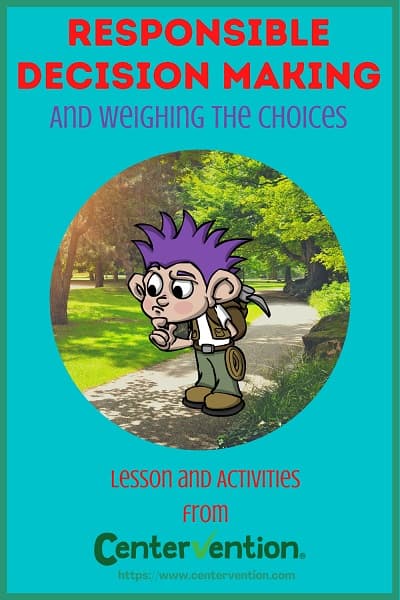How we act in challenging situations heavily relies on our moral code, an important component of responsible decision making. And for students, what they experience in school plays a large role in the moral development as they learn to navigate rules, fairness, and standing up for what is right.
For the youngest learners, this happens at the most basic level as they come to recognize positive and negative consequences for their actions. As students age, however, determining “rightness” becomes somewhat subjective, and it becomes clearer that there are gray areas. What is right for one person may, certainly, not be for another, and as students navigate the winding pathways of ethics, the adults in their lives, including teachers, largely influence how they will define what is right later in life.
Giving students the chance to actively sort through how to make responsible decisions supports their development as deep thinkers and problem solvers, as well as skilled communicators. As Danny Wagner of Common Sense Education adds, “By being critical, courageous, confident and independent, kids can change their schools and the world, emerging as better decision-makers more prepared to face adversity and support and defend uncommon—yet just—views.”
The responsible decision making activities below are appropriate for a range of moral development. Younger students will examine the reasoning behind common universal rules, and older students will consider the complexities of dilemmas that may have no one clear answer.
Recommended Grade Level: Elementary and Middle
SEL Skill(s): Empathy, Impulse Control
Duration: 30 minutes
Materials: (Available when logged in to Centervention educator account)
- Best Choice Scenario Cards
- Weighing the Consequences Worksheet
Responsible Decision Making Lesson Instructions
Note: The grade ranges provided serve as guides. Read through the materials carefully, and begin or end wherever feels appropriate for your group of students.
Tell students that today you will be revisiting the classroom rules. Have students list the rules together. As each rule is named, ask:
Why do we have that rule?
What might happen if we didn’t have that rule?
Invite students to share other rules that they know from school or home, as well as laws they may be familiar with. Again, have them discuss their thinking behind why we have certain rules, challenging their reasoning to go beyond “because breaking them is wrong.”
Example: “We don’t steal because the person you took from won’t have what they need.”
Middle School Extension: Continue the conversation by asking:
When is it hard to follow rules?
Is it ever okay to break a rule?
Practice Responsible Decision Making
Say “When there is a clear rule or a law, we know what is expected. For example, we don’t hit people because that hurts them and also doesn’t solve problems; and we don’t cheat on tests because it’s dishonest and won’t help you learn. Sometimes, though, figuring out the best decisions isn’t so easy and we have to stop and think about making a good choice.”
Choose 3 scenario cards that best reflect your students’ reasoning abilities, noting that they increase in difficulty. Break students into pairs or small groups and read the scenarios aloud. Allow several minutes for teams to discuss what they would do in the situation, then share answers with the whole group. Encourage students to recognize and respect that their choices may be different in situations where there is no clear rule or answer.
(Advanced Level) Dilemmas: Challenge students to consider what to do in situations where there is no easy solution. Provide students with a Weighing the Consequences worksheet, allowing them to think through a scenario of their choice. On the back of the page, students may write about a time when they faced a difficult decision, or a situation that required them to bend or break a rule and why they thought it was the right choice.
